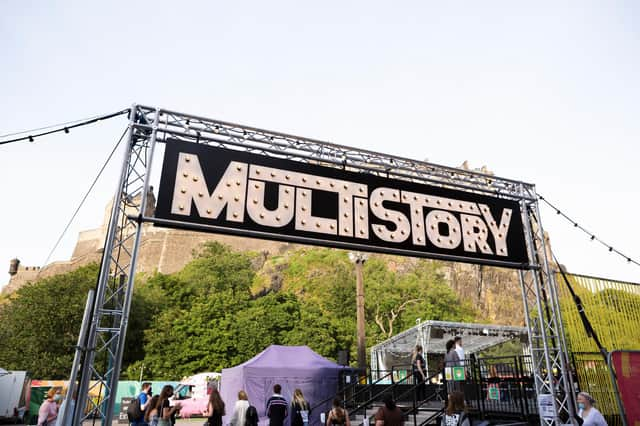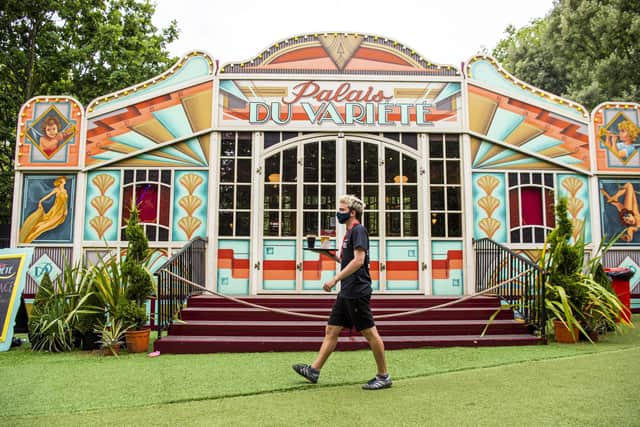Rules proposed to ensure workers at Edinburgh Festival Fringe are treated better


Promoters, producers, venues, funders and landlords would be asked to sign up to a new “set of standards” and best practice guidelines to help tackle long-standing concerns that performers, crews and other staff are under-paid if the shake-up is backed.
A key element is a total rethink of the financial model for Fringe artists which sees many of them effectively having to “pay to play”.
Advertisement
Hide AdAdvertisement
Hide AdThe overhaul is aimed at ensuring the Fringe, which saw a record 3,841 shows staged in 2019, becomes a “more diverse, accessible, sustainable and fair event” in future by the drawing of clear lines of responsibility for key areas.


Compiled by grassroots campaigners, the Future Fringe report, which is due to be published within the next weeks, suggests the Fringe has been dogged by a growth mindset and a constant pressure to expand, “no matter the cost”, which has made the event “harder to manage”.
It has been compiled following an open call for submissions last August, when the Fringe was cancelled for the first time in its history. At the time, the work of the campaign was described by Fringe Society chief executive Shona McCarthy as “really important”.
The new “Future Fringe” blueprint calls for change to ensure clear accountability over how the event is run, suggesting that key decisions are currently taken by “profit-driven organisations” like venues and Edinburgh University, which is a landlord to many of them, rather than the Fringe Society, which oversees the event.
Advertisement
Hide AdAdvertisement
Hide AdThe Fringe’s long-established “open access” ethos and “decentralised model” have been called into question ahead of the 75th anniversary of the festival in 2022, amid concerns that its current format effectively creates barriers based on race, class and disability.
It suggests there was a lack of “accountability” over ensuring Fringe workers get properly paid and a fear among performers that they did not have a voice as “there’s always someone else to take your place”.
The draft report’s findings state: “As a group of grassroots organisations, we believe the structures of the Fringe need to change in order to be more diverse, accessible, sustainable and fair.
“We would like to open a dialogue with stakeholders around these ideas, testing them and adapting them over time.
Advertisement
Hide AdAdvertisement
Hide Ad"We believe it is important to be transparent when making change, sharing both the successes and failures in order to help others move forwards, but, venues, participants, the council, Edinburgh University, the Scottish Government and the Fringe Society need to hold each other accountable to trying, and vice versa.
“The Edinburgh Festival Fringe is the biggest arts festival the world. It wasn’t always. We want to look at the story of the Fringe. Maybe this will help us understand where these problems started so we can begin to undo them.”
The report recommends that alternative funding and ticket models are pursued for the Fringe to ensure the event is “more financially stable and secure” for all those taking part.
It adds: “A way of ensuring companies at the Fringe are better funded and better paid to support enacting change across every level is crucial. Similarly, financial support for organisations working to improve the Fringe around the year is needed.”
Advertisement
Hide AdAdvertisement
Hide AdKey findings in the Future Fringe report were revealed ahead of its publication at an Edinburgh University-funded summit on the future of the city’s arts and cultural sector, which was held at Leith Theatre after this year’s Fringe had drawn to a close.
The Fringe Society reported that more than 395,000 tickets were sold for 942 registered shows in August.
Oli Savage, one of the founders of the Future Fringe campaign, told the summit: “At its most fundamental, the Fringe currently exists in a pseudo-open market landscape.
“To make it better and fairer, the Fringe needs rules. Where those rules come from, how they are enforced and who makes them is very much up for discussion, but that it is the key thing that’s been identified as being missing.”
Advertisement
Hide AdAdvertisement
Hide AdJosie Dale-Jones, co-director of Staging Change, one of the grassroots organisations involved in the Future Fringe campaign, said significant barriers to the festival changing included the involvement of corporate sponsors, the “pop-up nature” of the event and a lack of business skills in the arts sector.
She added: "There is a lack of transparency and understanding about the Fringe – a lot of participants feel unaware of the organisational structure of the festival and how they can promote change.”
Artist, writer and commentator Rosie Priest, who spoke at the Leith Theatre event, called for a new “steering group” to be set up to ensure the Fringe had a “critical friend”, suggesting that artists, venues, funders, community groups, audiences and the Fringe Society could all be represented.
Priest said: “It feels like a lot of the dialogue around the festivals is you’re either anti, or pro, but actually, people like me who talk openly and earnestly about some of the issues with the festivals, love the festivals, I want them to thrive – but I don’t want them to do so at the expense of inclusivity, workers rights and sustainability.
Advertisement
Hide AdAdvertisement
Hide Ad“These aren’t new issues, there have been campaigns and work done on these for years, and those critical friends have existed and been largely ignored, or publicly pushed against and labelled as ‘polarising’.
“This steering group could be that critical friend and hold space for those difficult conversations, leading to collaborative approaches, radical change and an opportunity for all parties involved in these difficult conversations to recognise one another’s stand points and have an open and supported dialogue resulting in actual positive change.
“A steering group who could provide some accountability to ensure sustainability, worker’s rights and inclusivity are being rigorously thought about and, more importantly, actioned on.”
Comment Guidelines
National World encourages reader discussion on our stories. User feedback, insights and back-and-forth exchanges add a rich layer of context to reporting. Please review our Community Guidelines before commenting.